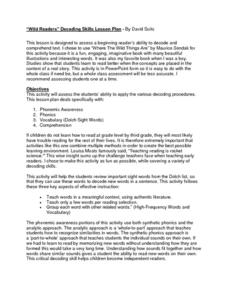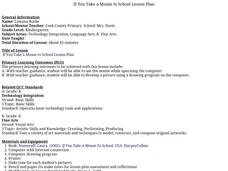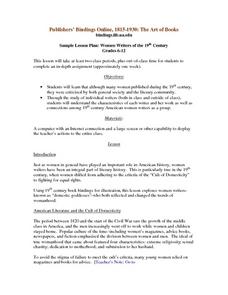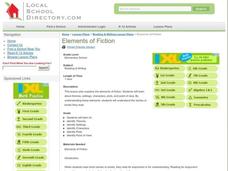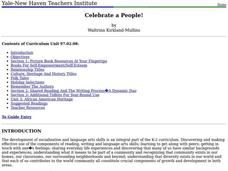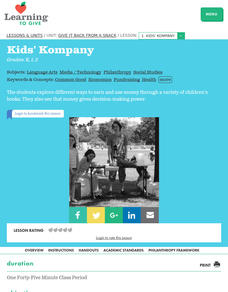David Suits
“Wild Readers” Decoding Skills Lesson Plan
Set young readers on the path toward fluency with this phonemic awareness resource. Based on the award-winning children's book, Where the Wild Things Are, this lesson allows beginning readers to practice isolating...
Curated OER
The Civil War Through a Child's Eyes
Students focus upon the Civil War era using research methods of drawing information from primary sources. Literature and photographic images reflect, communicate, and influence human perspectives of historical events. The lesson helps...
Curated OER
If You Take a Mouse to School Lesson Plan
The book If You Take a Mouse to School is sweet, enjoyable, and so fun to read. Little learners hear the tale of Mr. Mouse and all the trouble he causes. They discuss the book as a large group and then split up into smaller groups to use...
Curated OER
The Last of the Really Great Whangdoodles Multiple Choice Quiz
In this literature based multiple choice quiz worksheet, students answer questions based on the book The Last of the Really Great Whangdoodles by Julie Andrews Edwards.
Curated OER
Dramatizing Your Story
Pupils write a script, planning and recording improvisations based on personal experience and heritage, imagination, literature and history.
Curated OER
A Walk Around the School: Mapping Places Near and Far
After reading Pat Hutchins’ Rosie’s Walk, have your young cartographers create a map of Rosie’s walk. Then lead them on a walk around the school. When you return class members sequence the walk by making a list of how the class got from...
Pennsylvania Department of Education
I Know An Old Lady Who Swallowed a Fly
Students listen to the story I Know An Old Lady Who Swallowed a Fly and practice using their listening skills to respond to the story. In this listening skills lesson, students use objects represented in the story and place them on...
Curated OER
Writers of the 19th Century
Students are introduced to women authors during the 19th century. In groups, they read about the criticism they faced during this time period by the public and literary community. Using the internet, they research one author to...
Curated OER
Caldecott Medal Winners
Second graders identify Caldecott Medal winners. In this library media lesson, 2nd graders view an overhead transparency of Caldecott Medal winners from 1987-2004 and answer questions based on the data that is displayed.
Curated OER
Elements of Fiction
Learners identify key story elements in a fiction text. In this literacy lesson, students are introduced to the various elements of fiction such as the setting, plot, and theme. Learners read a short story of their choice and identify...
Curated OER
Celebrate A People!
Young scholars explore African-American students literature as an integral building block in empowering all young scholars to a better awareness when reading and writing. They use as a productive Social Studies tool for overall...
Curated OER
Farm Animal Stick Puppets
Students summarize a children's book relating to farm animals. They act out the events of the book with stick puppets they create. Students experience the concepts of dialogue and role play.
Curated OER
Friendly Neighbors
Learners review the days of the week and the meaning of unconditional kindness. In this days of the week and kindness lesson, students participate in a reading of Libba Moore Gray's Miss Tizzy. They talk about the days of the week and...
Curated OER
Introduction to Sea Horses
Students identify different types of sea horses. In this sea horse research activity, students learn associated vocabulary and listen as the teacher reads Elaine Landau's, Sea Horses A True Book. They visit assigned Internet sites to...
Curated OER
Making a Rainstick
Students construct a rainstick. In this music instructional activity, students investigate the history of the rainstick by reading the book Bringing the Rain to the Kapiti Plain by Verna Aardema. Students express their feelings about the...
Curated OER
Native American Culture
Students read a variety of Native American Literature and discuss the main idea by answering critical thinking questions about the poem. Students use context clues to understand the feeling of the Native American culture about the Earth....
Alabama Learning Exchange
The Moon
Young scholars explore the phases of the moon. In this solar system lesson, students listen to several books about the moon including The Moon Book by Gail Gibbons. Young scholars complete a KWL activity concerning the phases of the moon...
Curated OER
Give It Back From a Snack Lesson 1: Kids' Kompany
Students examine the ways to earn money and discover the different uses for money. They read children's literature and draw pictures of uses for money that benefit the common good.
Curated OER
Insect Communication and Harmful Insects
Seventh graders use children's literature in order to create an interesting context for the activity. The concept of insect communication is investigated in order for students to form educated hypothesis guesses.
Curated OER
Because of Winn-Dixie
Students make connections with the book Because of Winn-Dixie through writing. In this writing lesson, students pretend to be the main character and write a letter to her mother, using very descriptive language. Students also...
Curated OER
Pigs: Facts And Fun
Students complete a unit on pigs. They take a field trip to the fair and zoo, watch the video of "Charlotte's Web," create a poster, read and analyze "The Three Little Pigs," write a storybook, participate in a reader's theater, and make...
Curated OER
Who is Dr. Seuss?
Learn more about Dr. Seuss in an author study activity. After young readers create a KWL chart on information they know about Dr. Seuss, they take on group roles, such as the researcher or recorder, to find out more about Dr....
Curated OER
The Little Red Hen
Pupils review the of "The Little Red Hen," to make sure that they comprehend that the hen's three friends were the cat, the dog, and the goose. They experiment with character vocies. Students are asked how the gossipy goose would sound,...
Curated OER
Literature
Students develop new vocabulary through listening. They listen to comprehend and to obtain information.
